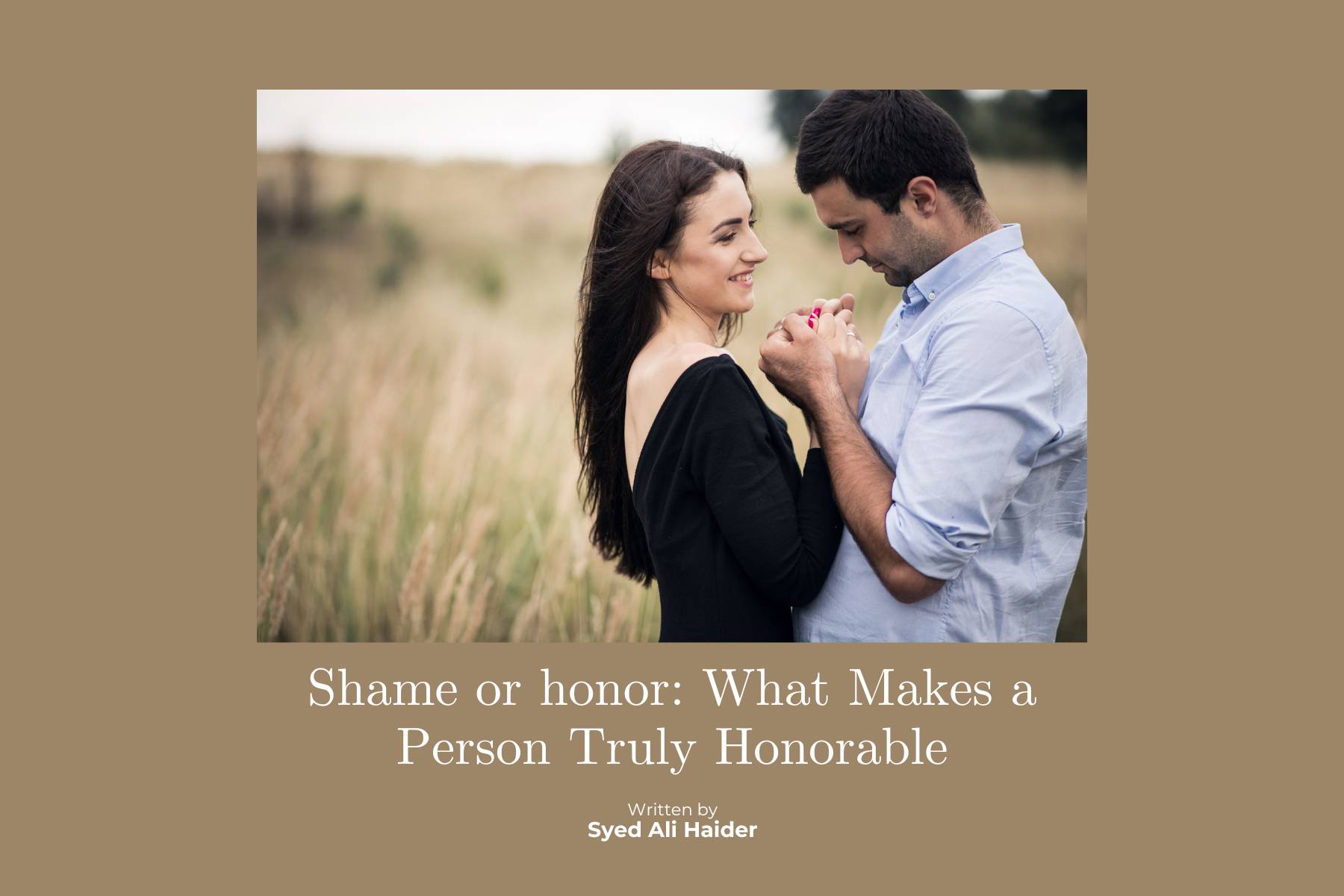Shame or honor: What Makes a Person Truly Honorable
Honor is one of those words that society throws around often, yet very few truly understand. For centuries, cultures across the world have associated honor with dominance, power, and authority. We are told that a man who commands respect, raises his voice, and imposes control over others is “honorable.” His presence is intimidating, and his word becomes law.
But let’s pause for a moment. Is that really what honor means? Is honor measured by how much fear someone can instill, or by how much respect they can show when they themselves make a mistake?
The truth is, honor is not about control it is about conscience. True honor belongs to those who feel shame when they are wrong, who acknowledge their mistakes, and who strive to make things right again.
Shame: The Hidden Sign of Strength
Shame often gets a bad reputation. People mistake it for weakness, embarrassment, or even cowardice. But in reality, shame is one of the greatest markers of human integrity.
When a man or a woman feels shame for their mistakes, it means they recognize that they have fallen short of their values. They are aware of the impact of their actions on others. That awareness itself is a form of strength.
Imagine two people:
- Person A makes a mistake, denies it, and stands proudly as if nothing happened.
- Person B makes a mistake, feels ashamed, admits it, and apologizes.
Which one would you trust more? Which one would you want as a partner, friend, or colleague?
Without doubt, it’s Person B. Shame is not a weakness it’s the starting point of accountability.
Guilt: The Bridge to Empathy
Shame is often the first stage, but what comes next is even more important: guilt.
Where shame can sometimes make people withdraw or isolate themselves, guilt pushes them toward reconciliation. Guilt says:
- “I hurt someone.”
- “I need to fix this.”
- “I must make it up to the people I wronged.”
This is the stage where empathy takes root. A guilty person doesn’t just regret their actions they actively seek to heal the wounds they caused. They put themselves in the other person’s shoes, feel their pain, and work to restore trust.
In fact, some of the strongest relationships are born not from perfection, but from mistakes followed by genuine guilt and the effort to make things right.
Society’s Double Standards
Unfortunately, society often flips this reality upside down. A man who apologizes is seen as “weak.” A woman who admits fault is considered “too soft.” On the other hand, those who dominate with aggression and refuse to back down are praised as “strong” and “honorable.”
This double standard has poisoned the way we judge character. Instead of valuing humility, we glorify arrogance. Instead of respecting empathy, we celebrate intimidation.
But history shows us that the most honorable leaders were never those who raised their voices the loudest. They were the ones who could bow their heads in humility, admit their flaws, and seek forgiveness.
The Real Test of Character
So how do we know if someone is truly honorable? It’s simple: watch them when they make a mistake.
- Do they feel ashamed?
- Do they admit their fault?
- Do they express guilt and try to repair the damage?
Or do they deny everything, stand tall in arrogance, and feel no remorse?
Those who never acknowledge their mistakes cannot be trusted. They lack honor, not because they made an error, but because they refused to accept it.
On the other hand, those who feel shame, carry guilt, and show empathy even if they stumbled are the ones worth standing beside.
Lessons for Relationships
This concept applies deeply to our personal relationships. In marriages, friendships, or family ties, mistakes are inevitable. Every person male or female will hurt others at some point, whether intentionally or not.
The question is: how do they respond afterward?
- An honorable partner will feel ashamed, apologize sincerely, and make genuine efforts to rebuild trust.
- A dishonorable partner will deny, shift blame, or act as if nothing happened.
If you want to judge whether someone is worth your commitment, don’t just look at their strengths or their achievements. Look at their response when they are wrong. That moment of humility or lack of it reveals their true character.
Conclusion: Redefining honour
Honor is not about dominance, loud voices, or intimidation. It is about accountability, empathy, and humility.
- Shame shows that a person recognizes their mistake.
- Guilt drives them to make amends.
- Empathy ensures they don’t repeat the same hurtful behavior.
A truly honorable person is not one who never errs, but one who feels shame when they do, embraces guilt, and grows into someone better.
So the next time you wish to evaluate someone’s character, don’t be impressed by their dominance. Instead, ask: Do they feel shame when they are wrong? Do they have the humility to admit their mistakes? Do they show guilt and empathy?
Because in the end, honor is not about power it’s about humanity.




